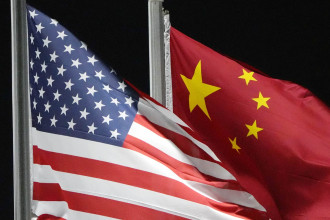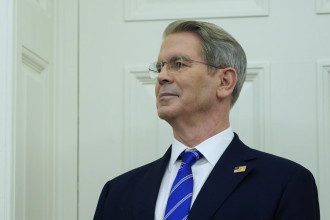-1745209206.jpeg)
In the face of global silence and fading international attention, Afghanistan stands at a historic and perilous crossroads. On April 17, the Friedrich Naumann Foundation for Freedom South Asia organised a webinar titled ‘Afghanistan at the Crossroads: Politics, Human Rights, and Humanitarian Challenges’, bringing together Afghan experts and activists to discuss the country’s grim reality under Taliban rule.
Since the Taliban returned to power in August 2021, Afghanistan has faced an unprecedented rollback of basic freedoms. Promises of reform and inclusivity made by the Taliban were quickly overshadowed by harsh policies that have devastated the rights of women and girls, crippled the economy, and led to a mass humanitarian crisis. The panel sought to dissect this political shift, examine human rights abuses, and explore the wider implications for regional and international stability.
-1745209206.jpeg)
-1745209206.jpeg)
Moderated by Reza Ehsan, a doctoral candidate at the South Asian University in New Delhi, the discussion featured four distinguished panelists: Dr. Abbas Farasoo, a former Afghan diplomat and current researcher at La Trobe University; Khalid Ramizy, CEO of the World Anti-Extremism Network; Shikiba Babori, journalist and founder of KALIMA; and Fereshta Abbasi, researcher at Human Rights Watch.
The first speaker, Shikiba Babori, set the tone with a powerful and personal account of how life has changed for women in Afghanistan. “Everything we had gained in the past 20 years has been wiped away,” she said. “The Taliban has pushed women out of public life completely.”
Since August 2021, Afghan girls have been banned from secondary schools and universities. Women are prohibited from most forms of employment and are barred from parks, gyms and public places. “It is not just discrimination,” Babori insisted. “It is systematic oppression. It is gender apartheid.”
She described how Afghan women today live in a state of constant fear, unable to participate in society without male supervision. “They’re not even allowed to travel more than 22 kilometres alone,” she added.
Still, Babori emphasised the resilience of Afghan women. Despite the risks, many continue to run underground schools, protest silently, and keep the spirit of resistance alive. “They are brave beyond words,” she said. “And the world must not look away.”
Expanding on this, Fereshta Abbasi from Human Rights Watch offered a grim assessment of the overall human rights situation in the country. “Afghanistan is the only country where girls are banned from education beyond sixth grade,” she said. “It is a violation of every international human rights convention.”
Abbasi highlighted that women are currently allowed to work in only three sectors: health, nutrition and primary education. Even there, the work environment is heavily restricted. “There is no due process. There is no justice. People are arrested without reason and disappear without a trace,” she noted.
A particularly disturbing trend, she said, is the Taliban’s encouragement of citizen-led enforcement. “Ordinary people – taxi drivers, shopkeepers – are now policing women. If a woman’s hijab isn’t considered proper, she can be denied service or even reported.”
Abbasi also pointed to the dramatic decline in press freedom. “There is no freedom of expression. Journalists are being harassed, detained or forced into exile. Civil society is being dismantled piece by piece.”
Perhaps the most haunting observation came in her final remark: “This isn’t just a rollback. It’s the total collapse of the human rights framework in Afghanistan.”
The discussion then turned to the political and economic collapse of the country, with Dr. Abbas Farasoo, a former Afghan diplomat now based in Australia, providing deep insight into how the Taliban has restructured the state.
“The Taliban didn’t just take over a government – they erased the system,” he said. Institutions that once supported Afghanistan’s democracy, however fragile, have been dismantled. “We don’t have ministries, we have ‘commissions’. Civil servants have been replaced with religious ideologues.”
Farasoo estimated that Afghanistan’s GDP has shrunk by over 30% since the Taliban takeover. With no formal recognition and limited international aid, the economy is in freefall. Over 90% of Afghans now live below the poverty line. “Afghanistan has become a state of despair,” he said. “More than 8 million Afghans have left the country. Those who remain are surviving, not living.”
The exodus of skilled professionals, especially women, has drained the country of its human capital. “It’s a brain drain on a catastrophic level,” he added.
While the humanitarian and rights issues are urgent, Khalid Ramizy reminded the audience that Afghanistan’s crisis also has a dangerous international dimension. “Terrorist groups are flourishing under the Taliban regime,” he said. “The Taliban has given space to Al-Qaeda, ISIS-K, and other foreign jihadist networks.”
Ramizy stressed that the Taliban’s ideological affinity with other extremist groups poses a serious security risk to South Asia, Central Asia and even Europe. “This is not just an Afghan problem. It’s a regional and global problem,” he warned.
He pointed out that these groups are using Afghanistan as a base for recruitment, training and planning. “The international community must not underestimate the long-term danger of allowing Afghanistan to become a hub of terrorism again,” he said.
Dr Farasoo noted the strategic double standards of Afghanistan’s neighbours. “While no country has formally recognised the Taliban, many are engaging with them behind closed doors,” he explained.
Iran, China, Russia, Pakistan and even India have all kept communication channels open, motivated by border security, trade or mineral access. “This selective engagement gives legitimacy to the Taliban without demanding reforms,” Farasoo said.
He criticised the international community for its lack of coordinated pressure. “There are no clear red lines. No demands for inclusion or rights protections. Just quiet diplomacy and realpolitik.”
Referencing his recent book, Proxy War in Afghanistan, he said the Afghan people have long suffered as pawns in a game of regional influence and international neglect. “This cycle will continue unless the global community changes its approach.”
The conversation ended with a sense of urgency. Each panellist underscored that the world’s silence is enabling the Taliban – and abandoning the Afghan people.
Abbasi made a strong appeal to international organisations and democratic governments: “You must act. You must speak up. Afghan women and civil society need your support more than ever.”
Babori added that the fight of Afghan women is not just local but universal. “This is a fight for dignity, equality and humanity. If we ignore Afghanistan, we are setting a precedent that women's rights are negotiable.”
Ramizy called for an inclusive international strategy to contain extremism, support displaced Afghans, and bolster local resistance. “We need a vision that combines security with human rights and development,” he said.
Afghanistan is at a crossroads – one where choices made today will shape the future of its 40 million people and impact global security. As the Taliban tighten their grip, as extremist groups rise, and as freedoms vanish, the silence of the international community is becoming louder than the suffering of the Afghan people.
The voices in this webinar were not just experts – they were witnesses. Their message was clear: Afghanistan needs more than sympathy. It needs action.



-1745561640.jpg)


